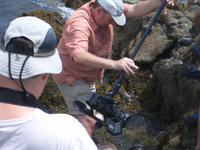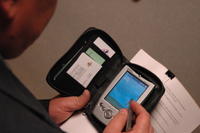
We shot 18 hours of action in Scout Camps in California and New York this past few weeks, and the results are pretty impressive. I'd had a bit of experience with a 2-day indoor shoot in Indianapolis in late June, but this was the big one for the summer.
Shooter Steve McWilliams aggressively maneuvered the new Sony pro camcorder on a monopod for a lot of the material, and we went to sticks for twenty or so "standup" interviews with Scouts and Scouters. Most of the latter we shot direct to camera with the mini Eyeliner.
Some quick thoughts:
We shot with what was essentially a two-man crew, backed up by a PA and a coordinator. The run-and gun nature of the shoot made use of a tech monitor irrelevant, but we do think that a third, strong PA/grip would be a requirement the next time around.
HDV rocks. We couldn't believe the format's adaptability and picture quality. The 16X9 frame opens things up compositionally, well-suited to dynamic shots. It's still video of course, and the latitude still does not compare with film, but this will be a very suitable medium for us, particularly in documentary-style work, for years to come. This particular camera has its drawbacks. Steve found the menu-based controls more of a bother than a help, and the optics of the integral lens give you virtually unlimited depth of field, requiring a lot of care in keeping the lens clean. For 6 grand, however, it's a bargain, and it clearly points the way to future cameras. The HDV dream cam might have interchangeable lenses, a ruggedized body, and an onboard hard drive that would store a day's worth of material uncompressed.
Content is king again. Here's a camera you can poke right into the action, as we often did, inches from the talent's faces. You can move it around on a stick, and shoot off-eye shots as long as you want with minimal physical effort (see Steve above with the low-tech "steviecam" in action. You can take it in a car, or hide under your raincoat in a subway. It's a less intimidating way to do interviews because it's so small and "un-professional" looking, and you can practically shoot in the dark.
Now, on the post side of the event, we're thinking about transferring all the footage directly into a series of hard drives via our FCP-HD application, once it's set up. This will give us access to the MPEG-4 assets within our post application. The camera tapes go on the shelf, there to be pulled for emergencies only. In the meantime, we have DVD's with and without timecode burn-in, a decent source of MPEG-2 video for web-and CD ROM-quality video.


